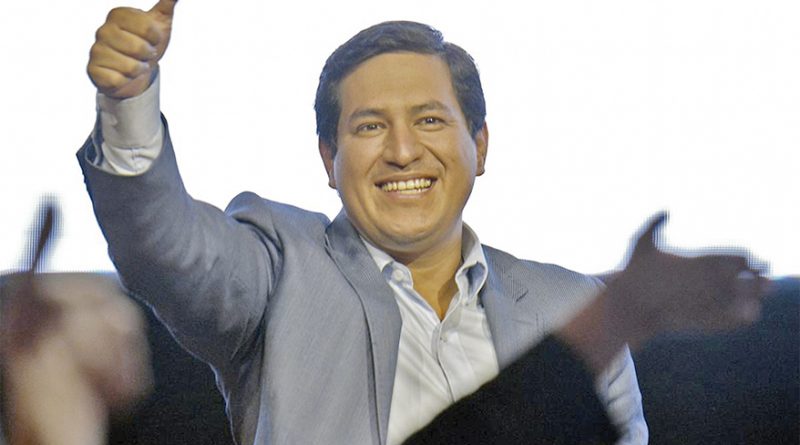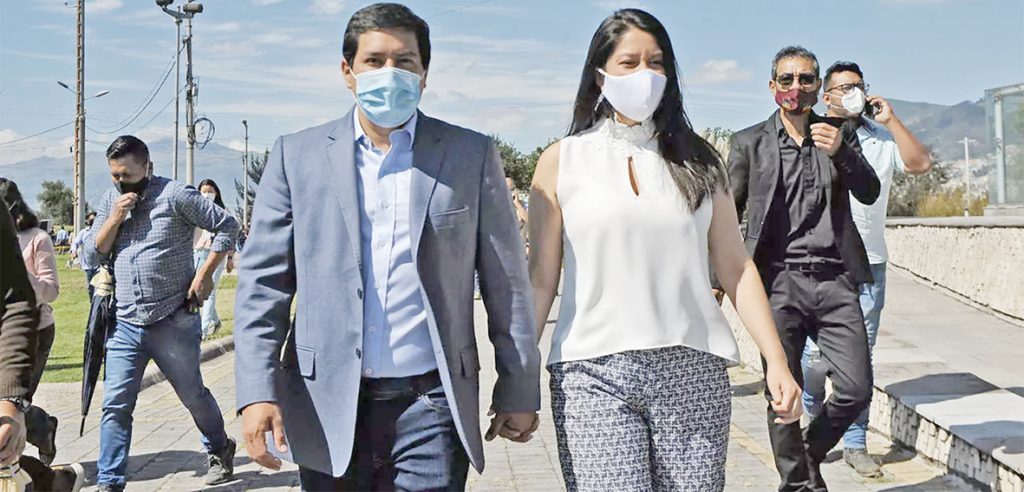Habrá segunda vuelta en elecciones presidenciales de Ecuador / Ecuador’s presidential race goes to round two
Ninguno de los candidatos que se presentaron a los comicios el 7 de febrero consiguieron los apoyos suficientes para ganar en primera vuelta, por lo que dos de ellos se enfrentarán de nuevo el próximo 11 de abril.
Con más del 98% de los votos escrutados, el candidato correísta Andrés Arauz se garantizó un lugar en la segunda vuelta, pero el puesto de su oponente todavía está en disputa entre el líder indígena Yaku Pérez y el empresario Guillermo Lasso.
Según cifras del Consejo Nacional Electoral (CNE) de este lunes, Arauz encabezaba el escrutinio con el 32,02% de los sufragios, seguido por el 20,13% de Pérez y el 19,49% de Lasso.
Arauz fue ministro de Correa, tiene 36 años y es llamado el “hijo pródigo” de la “Revolución Ciudadana”.
El exmandatario destacó este fin de semana su formación en temas como el desarrollo tecnológico y la educación.
Pero a pesar de la amplia ventaja a su favor en la primera vuelta, este no tiene la victoria asegurada en el balotaje del 11 de abril, pues los numerosos votantes que se decantaron por otros candidatos podrían unirse en su contra para cambiar el resultado final.
Lasso -quien es conocido por tener una agenda económica más conservadora- busca la silla presidencial por tercera vez.
Yaku Pérez es uno de los rostros visibles de la dirigencia indígena en el país.
Mientras que el indígena Yaku Pérez, que ejerció su derecho a voto en una parroquia rural de Cuenca, insistió en que la suya es una candidatura “del pueblo”.
El abogado de 51 años es un activo defensor del medio ambiente y uno de los rostros más visibles de la dirigencia indígena nacional.
En 2017 adoptó legalmente el nombre Yaku Sacha, que en quechua significa “agua de monte”.
El impacto de la pandemia
En el duelo entre correísmo y anticorreísmo que marcó las elecciones ecuatorianas este domingo se coló un tercer actor político: la pandemia.
El miedo al contagio en algunos ecuatorianos provocó, por ejemplo, que varias de las personas que debían cumplir el rol de autoridades de mesa se ausentaran, lo que retrasó el inicio del sufragio en cientos de centros de votación a lo largo del país.
“En este proceso tuve siempre claro que iría a votar, pues se trata de una elección trascendental en la que decidimos qué orientación política tendrá la respuesta a la recesión económica que se nos ha venido encima y se seguirá agravando”, le dijo a BBC Mundo.
Esta suerte no fue común en todos los centros de votación, donde el distanciamiento social entre votantes y la demora en el inicio de la jornada electoral generaron extensas colas durante la mañana y el mediodía.
Lo que faltó en muchos de estos escenarios fue la habitual presencia de vendedores informales de comida y personas encargadas de plastificar los certificados de votación, prohibidos en esta jornada para evitar aglomeraciones.
El Consejo Nacional Electoral recomendó, con este fin, que las personas con cédulas terminadas en número par votaran por la mañana y los de cédula impar lo hicieran por la tarde, pero al no ser una obligación sino una sugerencia, no se pudo determinar si la medida se cumplió a cabalidad.
Entre las recomendaciones del CNE también estuvieron el llevar un bolígrafo propio para marcar las papeletas y portar alcohol en gel para desinfectarse las manos.
La cantidad de papeletas también jugó en contra de la intención de agilizar el proceso. Además de para la elección de presidente y vicepresidente, había un papel para los asambleístas nacionales, otro para los asambleístas provinciales y otro más para los parlamentarios andinos.
En la provincia del Azuay, ubicada en el sur del país, hubo una quinta papeleta, ya que se realizó una consulta sobre la explotación minera en zonas que constituyen fuentes de agua. (BBC)
Ecuador’s presidential race goes to round two
None of the candidates who stood in the elections on February 7 got enough support to win in the first round, so two of them will face each other again on April 11.
With more than 98% of the votes counted, the Correista candidate Andrés Arauz was guaranteed a place in the second round, but the position of his opponent is still in dispute between the indigenous leader Yaku Pérez and the businessman Guillermo Lasso.
According to figures from the National Electoral Council (CNE) this Monday, Arauz led the vote with 32.02% of the votes, followed by 20.13% for Pérez and 19.49% for Lasso.
Arauz was Correa’s minister, he is 36 years old and is called the “prodigal son” of the “Citizen Revolution.”
This weekend the ex-president highlighted his training in topics such as technological development and education.
But despite the wide advantage in his favor in the first round, he is not guaranteed victory in the April 11 ballot, as the many voters who opted for other candidates could unite against him to change the final result.
Lasso – who is known for having a more conservative economic agenda – is seeking the presidential seat for the third time.
Yaku Pérez is one of the visible faces of the indigenous leadership in the country.
While the indigenous Yaku Pérez, who exercised his right to vote in a rural parish in Cuenca, insisted that his is a candidacy “of the people.”
The 51-year-old lawyer is an active defender of the environment and one of the most visible faces of the national indigenous leadership.
In 2017 he legally adopted the name Yaku Sacha, which in Quechua means “mountain water”.
The impact of the pandemic
In the duel between the correísmos and anticorreísmos that marked the Ecuadorian elections this Sunday, a third political actor entered: the pandemic.
The fear of contagion in some Ecuadorians caused, for example, that several of the people who were supposed to fulfill the role of polling station authorities were absent, which delayed the start of the vote in hundreds of voting centers throughout the country.
“In this process it was always clear to me that I would go to vote, because it is a transcendental election in which we decide what political orientation the response to the economic recession that has come upon us will have and will continue to worsen,” he told BBC Mundo .
This luck was not common in all voting centers, where the social distancing between voters and the delay in the start of the electoral day generated extensive queues during the morning and noon.
What was missing in many of these scenarios was the usual presence of informal food vendors and people in charge of laminating the voting certificates, prohibited on this day to avoid crowds.
The National Electoral Council recommended, for this purpose, that people with an even number of identification cards should vote in the morning and those with an odd number vote in the afternoon, but as it was not an obligation but a suggestion, it could not be determined whether the measure was fully met.
Among the recommendations of the CNE were also to bring your own pen to mark the ballots and carry alcohol gel to disinfect your hands.
The number of ballots also played against the intention of expediting the process. In addition to the election of president and vice president, there was a role for national assembly members, another for provincial assembly members, and another for Andean parliamentarians.
In the province of Azuay, located in the south of the country, there was a fifth ballot, since a consultation was carried out on mining exploitation in areas that constitute water sources. (BBC)



Debe estar conectado para enviar un comentario.